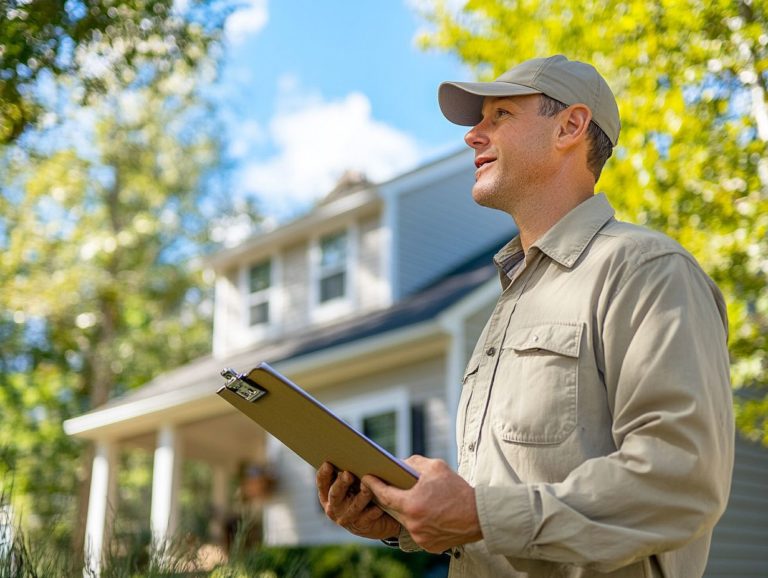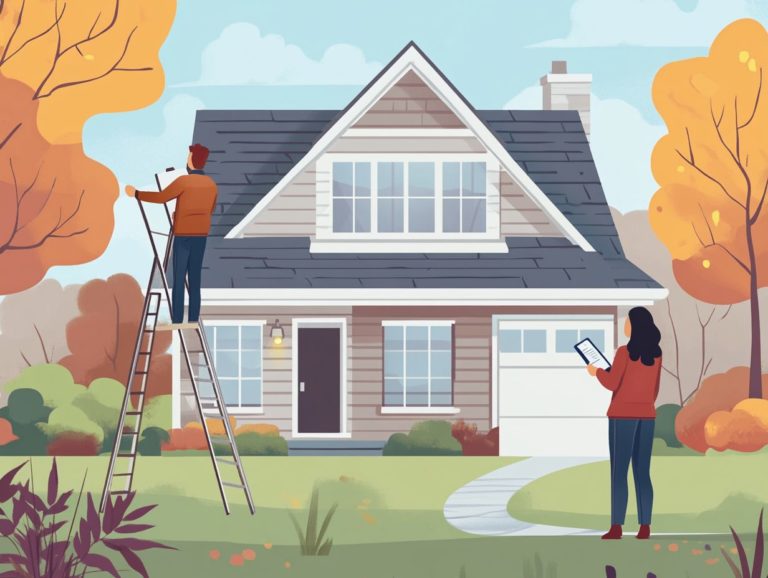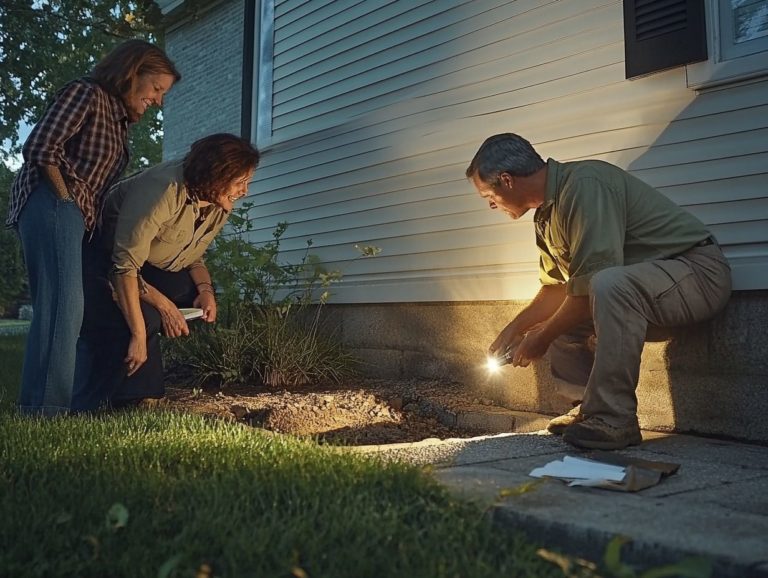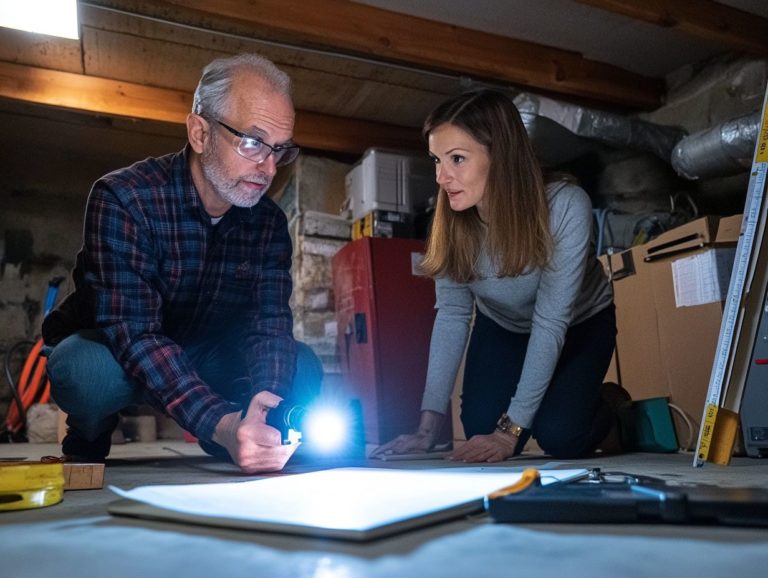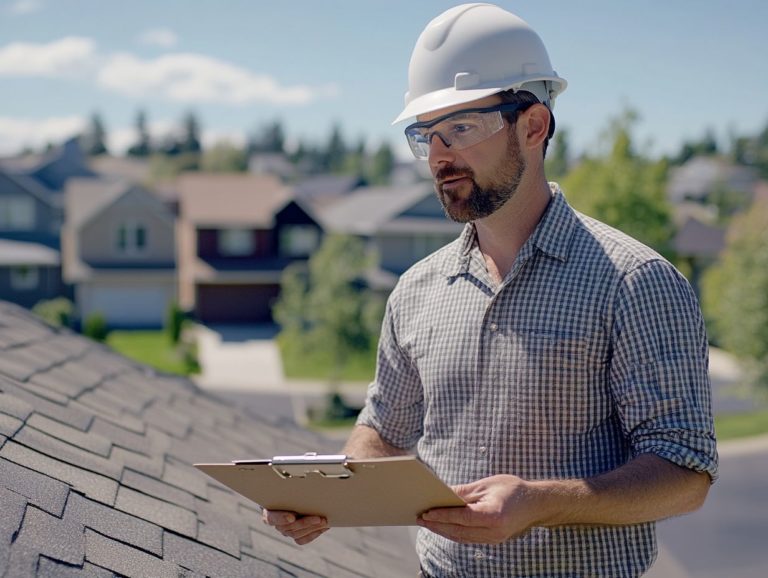How to Prepare Your Home for a Successful Inspection
When it comes to selling or buying a home, understanding home inspections can truly be a game changer for you. A thorough inspection uncovers potential issues and sets the stage for a seamless transaction.
This article will guide you through the essentials of home inspections. We will detail what they involve, the importance of preparation, and provide comprehensive checklists for both the exterior and interior of your home. You ll also learn about common issues that may arise and effective strategies for addressing them. This ensures you re well-prepared for inspection day and beyond.
Empower yourself with the knowledge that can lead to a successful inspection experience!
Contents
- Key Takeaways:
- Understanding Home Inspections
- The Importance of Preparing for an Inspection
- Exterior Inspection Checklist
- Interior Inspection Checklist
- Common Issues Found During Inspections
- Get Ready for Inspection Day!
- Final Steps for a Successful Inspection
- Preguntas Frecuentes
- Cu l es el prop sito de preparar mi casa para una inspecci n exitosa?
- Cu l es el mejor momento para comenzar a preparar mi casa para una inspecci n?
- Qu pasos debo seguir para preparar mi casa para una inspecci n?
- Necesito contratar a un inspector profesional para preparar mi casa para una inspecci n?
- Cu les son algunas se ales de alerta comunes que pueden afectar el resultado de una inspecci n de vivienda?
- C mo puedo aumentar las posibilidades de una inspecci n exitosa?
Key Takeaways:

Understand the purpose of a home inspection and why preparation is important. Create a checklist and focus on key areas of both the exterior and interior of your home. For detailed guidance, check out how to prepare for a home inspection to fix problems that come up in your inspection and close the deal faster!
Understanding Home Inspections
Grasping the ins and outs of home inspections can set you up for success as a seller. This process offers invaluable insight into your property’s condition and highlights potential issues that could influence the sale. To ensure you’re fully prepared, follow these key steps for a home inspection.
Conducted by certified home inspectors, these inspections include a complete check-up of your home s systems and structure, such as the electrical panel, heating and cooling system, roof, and foundation.
The inspection report that follows becomes a crucial document in your negotiations with prospective buyers. It can also assist you in pinpointing necessary repairs to elevate your property s appeal in a competitive market.
What is a Home Inspection?
A home inspection is a thorough examination of a property’s condition. A qualified inspector assesses various systems and components to ensure everything is functioning properly for you, whether you’re buying or selling.
During this process, the inspector uses a detailed checklist that covers essential areas like the heating and cooling system, which is vital for climate control and energy efficiency. They also closely examine the roof, where any signs of damage or wear could signal larger issues.
The electrical panel receives a comprehensive examination as well, ensuring safety and compliance with current codes since faulty wiring can pose serious risks. Plumbing is another critical aspect; the inspector checks for leaks and confirms that all fixtures are operating as they should.
By meticulously reviewing these core components, the inspector provides you with invaluable insights that help you make informed decisions, benefiting all parties involved.
The Importance of Preparing for an Inspection
Preparing your home for an inspection is crucial for showcasing your property to potential buyers. It impacts not only the inspection results but also shapes buyers’ perceptions of your home’s overall value and appeal. To learn more about this process, check out how to prepare your home for an inspection.
To effectively prepare, consider making necessary improvements, enhancing your curb appeal, and ensuring that all areas of the home are easily accessible. For more detailed guidance, check out this resource on how to prepare for a home inspection as a seller.
By proactively addressing potential issues, you can sidestep any unpleasant surprises in the inspection report and strengthen your negotiating position if repairs are necessary.
Why Preparation Matters
Preparation holds immense significance in the realm of home inspections. It allows you as a seller to present your property in the best light, ultimately influencing the inspection report. For more insights, check out this guide on how to prepare for your home inspection and swaying potential buyers’ decisions.
Thorough preparation enhances not just the overall presentation of your property but also plays a crucial role in reinforcing safety measures and reducing the risk of costly repairs later on. By tackling minor issues, like leaky faucets or cracked tiles, you can significantly boost buyer confidence, making them more likely to move forward with the purchase.
A well-maintained property often leads to a more favorable inspection outcome. This eases buyer concerns and facilitates smoother negotiations. In the end, these proactive steps can turn what might seem like a daunting home sale process into a seamless and rewarding experience for everyone involved.
Prepare your home wisely and watch it shine on inspection day!
Exterior Inspection Checklist

The exterior inspection checklist serves as a helpful tool for you, the seller, to assess the outward condition of your property.
It highlights key areas that play a vital role in curb appeal and overall structure, including the roof, foundation, and landscaping.
Use this checklist to evaluate your home’s exterior thoroughly, helping to pinpoint potential issues that may arise during the formal inspection process.
Addressing these elements creates a fantastic first impression and boosts your chances of a successful inspection!
Key Areas to Focus On
Now, let s dive into the important areas to inspect. During your exterior inspection, it s essential to focus on key components such as the roof, foundation, and HVAC system (heating, ventilation, and air conditioning system).
These elements support stability and affect energy efficiency and safety. For example, regularly checking your roof for missing shingles, leaks, and signs of wear can help you avoid costly water damage and extend its lifespan.
Likewise, assessing the foundation for cracks, moisture intrusion, and settlement issues is vital, as a compromised foundation can lead to serious problems down the line. Don t overlook the HVAC system either; inspecting it for signs of inefficiency, such as blocked vents or unusual noises, can improve airflow and reduce your energy bills.
By implementing preventive measures like routine maintenance and timely repairs, you ensure these crucial areas remain in top-notch condition.
Interior Inspection Checklist
An interior inspection checklist is essential for evaluating the condition of various rooms and components within your home, including the kitchen, appliances, and electrical panel.
By using this checklist, you can ensure that everything adheres to safety and functionality standards before undergoing a formal inspection. This proactive approach streamlines the process and safeguards your investment and peace of mind.
Tips for Preparing Each Room
Preparing each room for inspection requires meticulous attention to detail, including thorough cleaning, decluttering, and ensuring that all areas are safe and accessible for inspectors to conduct their evaluations effectively. For more insights, check out how to prepare for a home inspection to follow best practices.
Start by assessing the condition of your walls, floors, and ceilings. Look for any signs of damage or wear that might raise concerns during the inspection.
Clear out unnecessary items to create a spacious environment, allowing inspectors to move freely and explore every corner without obstruction.
Enhancing cleanliness involves tackling dust buildup, disinfecting surfaces, and making sure all appliances are functioning properly. Safety precautions should be your priority check smoke detectors, ensure proper lighting, and secure any potential hazards.
Finally, improving accessibility means removing barriers like cluttered walkways or loose rugs to create a welcoming space that s easy for everyone to navigate.
Common Issues Found During Inspections
Common issues discovered during inspections can greatly impact your sale!
Concerns such as water damage, foundation problems, and necessary repairs may deter potential buyers and spark extensive negotiations.
How to Address and Fix Problems

Addressing and fixing issues highlighted during inspections is crucial for you, the seller. It helps you maintain a strong negotiating position and can even elevate the market value of your home through necessary improvements.
By proactively tackling common inspection problems like outdated electrical systems, plumbing leaks, or roofing concerns, you prevent costly repairs down the line and build confidence in potential buyers.
Investing in energy-efficient upgrades can yield significant returns and attract eco-conscious consumers. Plus, enhancing curb appeal with fresh landscaping or facade improvements can make your property even more enticing during walkthroughs.
Prioritize transparency and be ready to provide documentation on repairs to foster trust. This shows your commitment to ensuring the property is not just livable, but also a smart investment.
Start your inspection prep today to ensure you attract the best buyers!
Get Ready for Inspection Day!
To prepare for inspection day, take proactive steps by learning how to prepare for a successful home inspection. This ensures your home is ready for evaluation.
What to Do Before and During the Inspection
Make your home accessible for the inspectors. This helps them do their job efficiently.
Spot any last-minute details to impress buyers.
Declutter to create clear paths. Ensure crawl spaces and attics are easy to access.
Make sure utilities work. Check that lights shine, doors open and close easily, and appliances are in good shape.
Clean your home thoroughly. A tidy space makes a great impression.
Be available for inspector questions. However, give them room to work.
Final Steps for a Successful Inspection
After inspection, carefully review the report for details.
Follow up on the findings and make necessary changes. This keeps your home appealing to buyers.
Following Up and Making Necessary Changes
Review the highlighted issues in the report right away.
Rank them by urgency and importance.
Fix major concerns first, like plumbing leaks or electrical hazards. These heavily influence buyer decisions.
Create a timeline for these changes. This keeps everything on track.
Hiring pros for repairs boosts your home s value and competitiveness.
Engaging in these improvements builds buyer trust and positions you well during negotiations.
Preguntas Frecuentes

Cu l es el prop sito de preparar mi casa para una inspecci n exitosa?
Preparar su casa para una inspección exitosa puede aumentar su valor y hacerla más atractiva para posibles compradores. Para obtener más información, consulte cómo preparar para una inspección de casa como comprador. También puede ayudar a identificar cualquier problema potencial que necesite ser abordado antes de poner su casa en el mercado.
Cu l es el mejor momento para comenzar a preparar mi casa para una inspecci n?
El mejor momento para comenzar a preparar su casa para una inspecci n es tan pronto como decida ponerla a la venta. Esto le dar suficiente tiempo para hacer las reparaciones o mejoras necesarias antes de que tenga lugar la inspecci n.
Qu pasos debo seguir para preparar mi casa para una inspecci n?
Primero, desh gase del desorden y limpie a fondo su casa para que se vea espaciosa y bien mantenida. A continuaci n, aseg rese de que todos los electrodom sticos y sistemas est n en buen estado de funcionamiento. Finalmente, aborde cualquier problema potencial, como fugas o da os estructurales, antes de que tenga lugar la inspecci n.
Necesito contratar a un inspector profesional para preparar mi casa para una inspecci n?
No, no necesita contratar a un inspector profesional para preparar su casa para una inspecci n. Sin embargo, se recomienda contratar uno para la inspecci n real para garantizar una evaluaci n imparcial y exhaustiva de su casa.
Cu les son algunas se ales de alerta comunes que pueden afectar el resultado de una inspecci n de vivienda?
Algunas se ales de alerta comunes que pueden afectar el resultado de una inspecci n de vivienda incluyen da os por agua, moho, plagas, sistemas el ctricos o de fontaner a obsoletos y problemas estructurales. Es importante abordar estos problemas antes de la inspecci n para evitar cualquier problema potencial.
C mo puedo aumentar las posibilidades de una inspecci n exitosa?
Para aumentar las posibilidades de una inspección exitosa, aborde cualquier problema potencial antes de la inspección. Asegúrese de que sea fácil acceder a todas las áreas de su casa, como el ático y el espacio de rastreo, siguiendo estos tips para una inspección exitosa!
Tambi n, verifique que todos los sistemas y electrodom sticos funcionen bien. Proporcione documentos de cualquier reparaci n o mejora reciente en su hogar. Prep rese ahora para asegurar una inspecci n exitosa!

